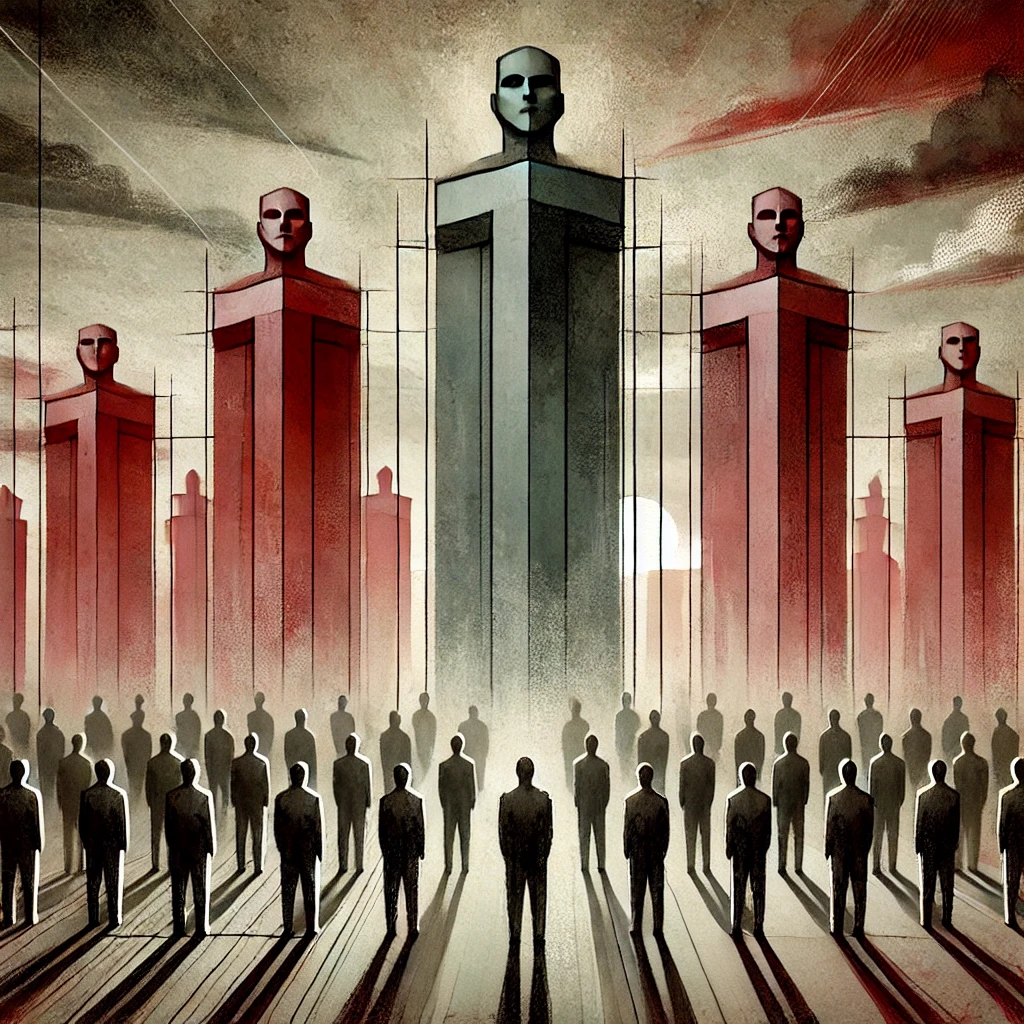The Dance with the Devil
Since the dawn of human consciousness, the figure of Satan has served as a cautionary symbol, warning against the perilous allure of superiority. Beneath the layers of mythology, however, lies a deeper interpretation: Satan as a metaphor for the unhinged ego. This internal force not only tempts individuals toward self-destruction but also fuels the collective impulses that give rise to oppressive ideologies and fascism.
Across various traditions, stories of defiance—from Lucifer’s fall to the Gnostic Demiurge—illustrate the ego’s relentless pursuit of superiority. This desire, rooted in pride and a refusal to submit, reflects a timeless struggle within the human psyche. However, the ego’s allure extends beyond personal rebellion; it entices us collectively, inviting us into a cycle of dominance and exclusion that mirrors the very essence of fascism.
Fascism mobilizes this collective ego by promising power and belonging, enabling individuals to channel their insecurities into superiority over an “other.” This article will explore how Satan, as an archetype of the ego, exemplifies the dangers of unchecked pride on both personal and societal levels. Through scriptural passages and interpretations, we will trace how the ego’s pursuit of dominance reflects the inner workings of fascism, drawing us toward a shared downfall rooted in our own projections.
Religious Narratives of Ego and Downfall
Throughout various traditions, the symbolism of ego and its destructive drive for superiority is embodied in figures like Lucifer, Iblis, the Gnostic Demiurge, and Ravana. In Christian texts, Lucifer’s fall is portrayed as a result of his desire to elevate himself above God, with his pride leading to his downfall. Similarly, in Islam, Iblis’s refusal to bow before Adam reflects the ego’s need to assert its own superiority, driven by arrogance. The Gnostic Demiurge also embodies this theme, as his ignorance of the true divine reality mirrors the ego’s self-centered blindness to interconnectedness. Meanwhile, in Hinduism, Ravana’s unchecked desires and sense of dominance lead to his inevitable defeat. Together, these stories illustrate how ego’s relentless pursuit of superiority ultimately results in self-destruction.
In Christianity, Lucifer’s origin story is drawn from two key passages in the Old Testament, though neither explicitly names him as “Satan.” These texts offer a metaphorical representation of a being who sought to elevate himself above God, embodying the rebellion and pride characteristic of the ego.
Isaiah 14:12-15 states:
“How you are fallen from heaven, O Lucifer, son of the morning! How you are cut down to the ground, which did weaken the nations! For you have said in your heart, ‘I will ascend into heaven, I will exalt my throne above the stars of God… I will be like the Most High.’ Yet you shall be brought down to hell, to the sides of the pit.”
This passage portrays Lucifer as someone driven by a desire for superiority. His ambition to “ascend into heaven” and place himself above the stars of God reflects the ego’s insatiable need to rise above others and even challenge divine authority. His pride becomes his downfall, serving as a powerful symbol of how unchecked ego leads to self-destruction.
Ezekiel 28:12-19 adds depth to Lucifer’s story:
“Your heart became proud on account of your beauty, and you corrupted your wisdom because of your splendor.”
This passage highlights how the ego distorts even admirable qualities such as beauty and wisdom. Lucifer’s perfection became the very source of his corruption, illustrating how the ego warps even virtues into tools for self-glorification. Together, these passages present Lucifer’s fall as the inevitable consequence of his attempt to usurp divine authority, making him a potent metaphor for the ego’s drive to elevate itself beyond its rightful place.
Islam offers a parallel narrative in the form of Iblis, whose story similarly revolves around arrogance and rebellion. Iblis’s refusal to accept the divine order reflects the same internal struggle characterized by the ego’s defiance.
Surah Al-Baqarah 2:34 recounts:
“And when We said to the angels, ‘Prostrate before Adam,’ they all prostrated except Iblis. He refused and was arrogant and became of the disbelievers.”
Here, Iblis’s refusal stems from his belief that he is inherently superior due to his origin. This arrogance mirrors the ego’s tendency to compare and assert itself over others based on superficial differences.
Surah Sad 38:76 expands on this, where Iblis asserts:
“I am better than him. You created me from fire and created him from clay.”
Iblis rationalizes his actions, insisting that his nature as a being of fire makes him superior to Adam, created from clay. This represents the ego’s constant need for validation, comparison, and dominance. In both verses, Iblis’s rebellion serves as a symbol of the ego’s defiance, its refusal to submit to a higher order, and its ultimate downfall.
In Gnostic tradition, Satan is often symbolized by the Demiurge, a figure representing arrogance and delusion. The Demiurge, a lesser deity who mistakenly believes himself to be the supreme being, serves as a metaphor for the ego’s inflated sense of self-importance.
In The Apocryphon of John, the Demiurge declares:
“I am God, and there is no other God beside me.”
This statement illustrates the Demiurge’s ignorance of the greater divine reality, much like how the ego blinds itself to interconnectedness. The ego, much like the Demiurge, elevates itself above others, believing in its self-sufficiency and superiority. This ignorance leads to chaos and separation from the true divine source, reinforcing the dangers of an unhinged ego.
Although not directly associated with Satan, Ravana from the Ramayana embodies many of the same traits seen in other ego-driven figures. The ten-headed demon king, Ravana, was known for his immense power and pride, and his downfall began with his abduction of Sita, Lord Rama’s wife.
Ravana’s inability to control his desires reflects the ego’s unchecked pursuit of dominance and gratification. His sense of superiority blinded him to the consequences of his actions, ultimately leading to his defeat by Rama. The story of Ravana illustrates the internal battle between the higher self and the ego, where unchecked desires inevitably lead to self-destruction.

The Ego’s Role in Fascism
As explored in Shadow & Light, fascism preys upon the individual ego by projecting repressed desires onto an external group or cause. When the masses align themselves with a group identity, they experience an illusion of collective strength and purity, which is deeply satisfying on a psychological level.
By encouraging individuals to externalize their repressed traits and insecurities onto others, fascism transforms individual vulnerabilities into collective judgments. This process allows people to avoid confronting their own inner darkness—a darkness often socially constructed and only perceived as such. By displacing insecurities onto others, individuals can escape self-reflection.
Through this manipulation, fascism converts personal anxieties into a shared sense of supremacy, binding individuals to a group identity defined by exclusion and perceived strength. Rather than solely addressing individual struggles for significance, fascism merges these struggles into a collective framework that promises validation and dominance over “the other.” In this way, it becomes not merely a personal psychological phenomenon but a collective force that exploits shadow projection to foster division and hierarchy.
Collective Projection and Fascism
Projection occurs when individuals deny their own repressed traits, externalizing them onto others. This mechanism fuels systemic issues like racism and intolerance. When these projections are scaled to a societal level, they contribute to the formation of systems like fascism, where the unhinged ego’s desire for superiority dominates and marginalizes others. The avoidance of self-awareness and shadow integration perpetuates societal division, as individuals refuse to acknowledge their own complexities and instead reinforce collective identities built on exclusion.
This attachment provides a false sense of strength and fosters an “us versus them” mentality. As a result, fascism doesn’t merely exploit personal ambitions; it molds these ambitions into an exclusionary collective identity, rooted in hierarchy and division.
For instance, anti-immigrant sentiments across Europe reflect this process of projection. Migrants and refugees are often framed as threats to national identity and stability, which amplifies existing fears within dominant groups. By projecting anxieties about economic and cultural change onto an “other,” individuals strengthen their sense of in-group cohesion through shared opposition. This displacement of fear onto outsiders reinforces superiority, allowing individuals to feel secure in a collectively defined identity.
Similarly, the rise of right-wing populist movements exploits fears of societal shifts, such as changes to traditional values. Political actors frequently frame issues like LGBTQ+ rights, immigration, or secularism as existential threats to cultural norms. By manipulating insecurities about personal identity, these movements enable people to project their concerns onto broader societal scapegoats, fostering exclusionary attitudes and bolstering the idea of a superior in-group.
These examples illustrate how fascist and populist movements manipulate collective projection, transforming complex societal issues into simplified narratives of “us vs. them.” By encouraging shadow projection, such ideologies reinforce the ego’s desire for validation through dominance, leading to increased division and conflict. A society that fosters self-awareness and shadow integration can counter these forces, moving towards unity by reducing the allure of authoritarianism and exclusionary ideologies.
Superiority and Fascism: The Ego’s Collective Appeal
“[Wilhelm] Reich’s completely serious question with respect to the rise of fascism: ‘How could the masses be made to desire their own repression?’ This is a question which the English and Americans are reluctant to deal with directly, tending too often to respond: “Fascism is a phenomenon that took place elsewhere, something that could only happen to others, but not to us; it’s their problem.” Is it though? Is fascism really a problem for others to deal with? Even revolutionary groups deal gingerly with the fascisizing elements we all carry deep within us, and yet they often possess a rarely analyzed but overriding group ‘superego’ that leads them to state […] that the other is evil (the Fascist! the Capitalist! the Communist!), and hence that they themselves are good.
Michel Foucault
As Wilhelm Reich asked, “How could the masses be made to desire their own repression?” Fascism manipulates human psychology by offering a sense of validation and belonging to a “chosen” group, where individuals feel superior to others. This desire for validation drives people to embrace the very systems that repress them, blinding them to the equality and humanity of those outside their in-group.
Fascist leaders position themselves as absolute authorities, exploiting this need for validation through group superiority. However, these charismatic leaders are often under the influence of the same psychological forces. Both Adolf Hitler and Donald Trump, for instance, have been linked to personal struggles with inferiority complexes. Hitler, shaped by early rejections and personal failures, sought validation and superiority by positioning himself as the savior of the Aryan race. Trump’s leadership similarly reflects a need for dominance and public adoration, revealing a parallel search for validation.
This dynamic of control and validation is crucial in understanding how fascism draws not only its followers but also its leaders into a cycle of power and ego-driven superiority. Rather than fostering unity, this drive for cultural and moral superiority fractures communities, undermining their growth.
The Nature of Fascism
In our next article, The Nature of Fascism, we will explore how fascism embeds itself within belief systems, distorting them to serve its own ends. From Nazi Germany’s manipulation of Christian identity to modern movements in the U.S. fusing nationalism with religious superiority, we’ll examine how fascism parasitically feeds on collective anxieties and desires for power.
We’ll delve into how these mechanisms not only foster division but also perpetuate cycles of dominance and repression, revealing the deeper psychological workings of fascist control.
If this piece moved you and you believe in the vision of HiveGeist — confronting ego, unmasking fascism, and planting seeds of collective transformation — I would be deeply grateful for your support. Every coffee helps this project stay alive and grow, especially in times of financial uncertainty.

Literature Index
Deleuze, G. and Guattari, F. (1983) Anti-Oedipus: Capitalism and Schizophrenia. Minneapolis: University of Minnesota Press.


0 Comments